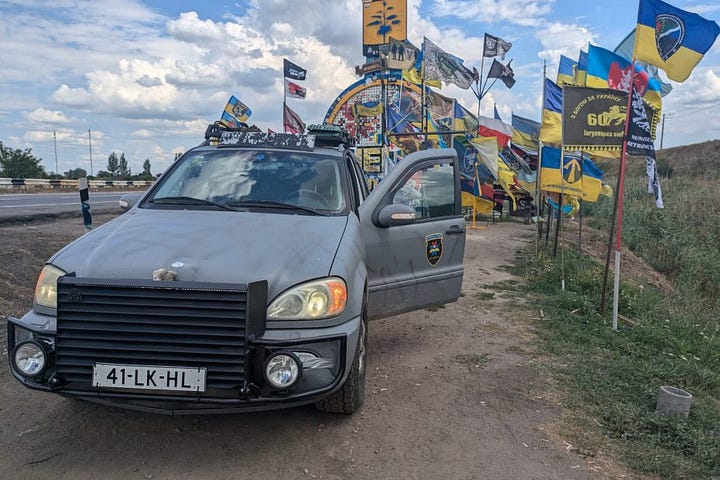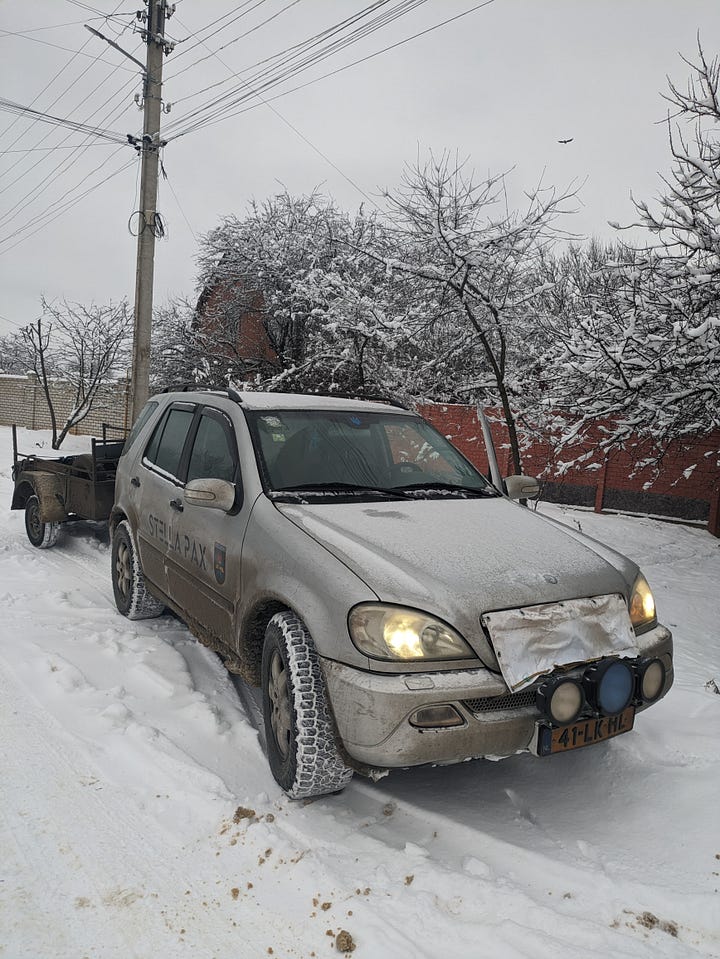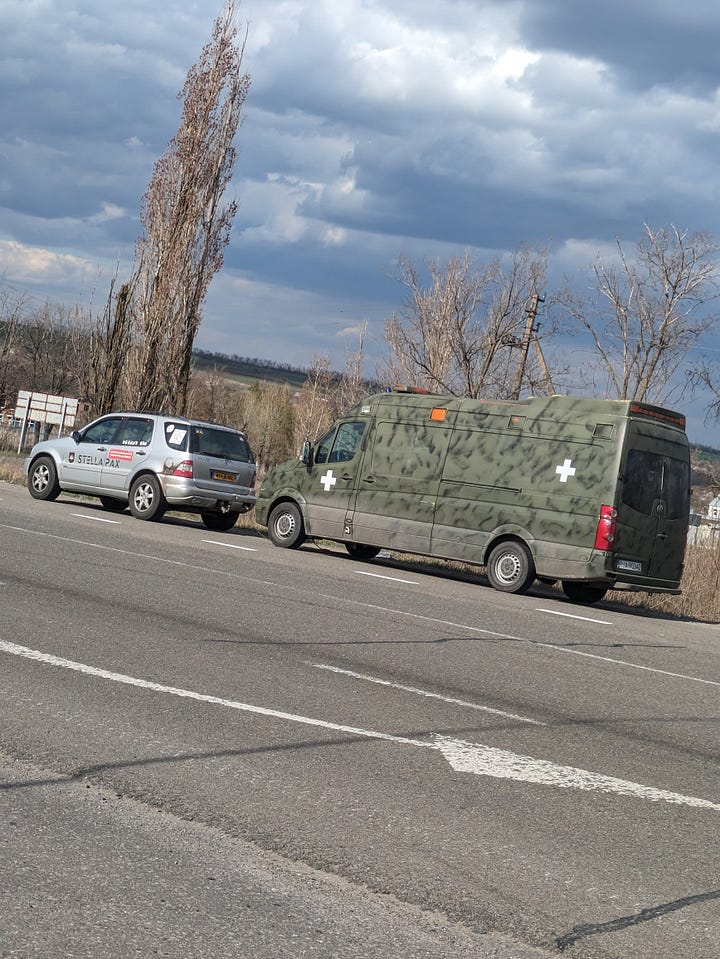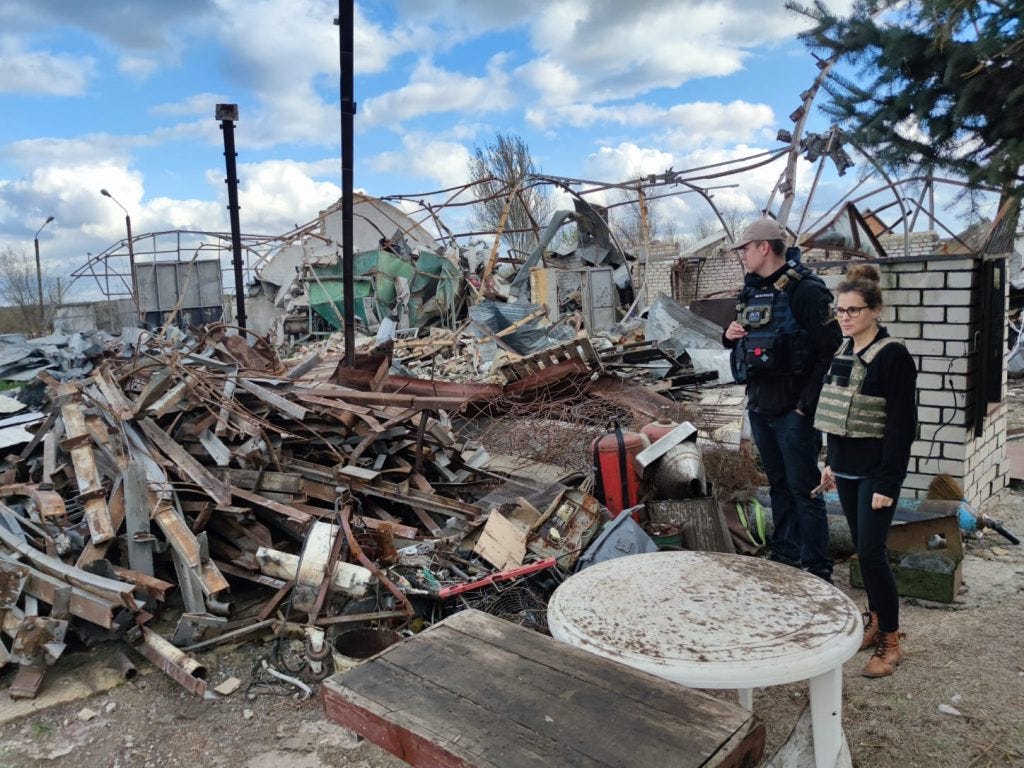One Guy, One Car, One Job at a Time
‘Small foundations with very limited resources can still get a lot done.’
In this blog I try to focus on Ukrainians, but there are some exceptional independent foreign volunteers out here too. Dutchman Ard-Pieter van Zuijlekom – Pete – founded the Stella Pax Foundation two years ago. His one-man mission to Donetsk is simple: find things that need doing, and do them. For example, when Universal Aid Ukraine took 400 hygiene kits to Yampil they needed an extra car.
A few nights ago he came to the UAU base, mid-evening. ‘Don’t you worry about curfew?’ I asked (curfew here is 2100). ‘Not driving a car like this. They just assume it’s military,’ replied Pete. We sat at the kitchen table drinking water - Donetsk is a dry county - and talking about familiar, original subjects because everyone who comes out east is both similar and unique: all devoted to helping Ukraine to victory, all in their own way.
How and why did you come to Ukraine?
I have always had a dislike for the way Russia does politics. For as long as I’ve been alive – which isn’t very long, 25 years – Russia has always played the victim, but at the same time played the strongman. There’s all the memes about Putin being so macho and all that, but he’s constantly bitching about the whole world being together [against him]. It doesn’t match. They have a very dishonest way of doing politics. And all the politics they have influenced in Europe have been the worst kind imaginable.
When I initially came out, I figured I would just be for a month. I joined a foundation, but that didn’t work out. I saw certain things that, in my eyes, we could be doing better. That got shut down, and there was a part of me that was just like, I want to show that I can do better!
I still work with some genuinely amazing people like Casus Pax, UAU, Ukraine Mission UK and others, but I can have my own fundraising in the Netherlands: the Dutch part of the foundation is essential. I couldn’t do what I do without the support of my family. At the start, I operated through my church: churches in the Netherlands count as charities when you donate money to them. But generally, that's a bit less credible than actually having your own foundation, because having a foundation does come with oversight.
And now I can't really see myself going back to the Netherlands. It’s difficult when you have a friend come to you telling you, like, one of his best friends got killed that day, and he’s distraught. Then you're in the Netherlands, and you have someone coming at you, the same level of distress about a corporate deadline that he himself invented… Like, is this real?
What kind of work do you do?
As a tiny foundation, we don't have the logistics of the Red Cross or UNICEF. But what you can do is constantly be around, see where there's a crack in the system, and try to fill that crack.
So it's all tiny, but still, you've played a part in a bigger thing. That's where small foundations help. I remember when the dam broke near Kherson, I think it took UNICEF more than a month to actually get into the city, and up until then, it was like hundreds of tiny foundations that were basically like, OK, well, what can we do?
Small foundations with very limited resources can still get a lot done, even if it's just having fuel and a running car. Another foundation might have 90% of the work prepared: they have the supplies, they have the mission set out, they’ve done the risk assessments and then they’re like, oh, we don’t have a car. And at that point, you can jump in and help out. I'm not driving every day with massive delivery, I haven’t the resources or the capacity. But you can still help people out in an essential way with very limited money.
You play an essential part in a bigger thing, and you have to be out there for that to work, you have to be a reliable person to call. The nice thing about Kram is that you have a lot of humanitarian infrastructure and a lot of people you can call on… If the battery dies on my car, I’m very happy that I can call Lars and he can be there in a few minutes so I can start my car.
We also used our own fairly limited funds to fill in some gaps in UAU’s inventory [for the Yampil trip]. We try to fill very specific requests inside Ukraine with money, since that’s the most flexible resource. You don’t have to stockpile food if you can buy it on short notice.
But taking deliveries and then finding people with specific requests for the items received is another thing that takes up a lot of time Specific equipment needs specific people to take the aid and do something with it. You can’t just hand someone specialised medical monitoring equipment and expect that it’ll see good use.
Sometimes recipients need parts to help with operating a decice with a different system, too. For example, if you deliver something from the UK without a plug adapter there's a decent chance it won't see use. Since they can't use it right away, so they put it in storage, and then never find the time/forget about getting a plug adapter. It’s about having them do as little work as possible.
You have to be here in Ukraine to make sure things are done right.
What do you on a typical day?
A lot of driving, to be honest! Yesterday I was driving a couple of medics from Kramatorsk to a stabilisation point [a basic clinic near the front line to which wounded soldiers are brought before being transferred to hospital], and then I drove back, because they can't have cars parked up near a stabilisation point. And that's nothing, it's not even worth mentioning. But still, you've played a part in a very big thing, which is that all these medics went to work at that stabilisation point for the weekend, and after the weekend I came to pick them up and drop them off in Kramatorsk.
My foundation is literally me and my car, Mary-Lou. I mention my car as a separate thing because that’s really important. I pay for it with my own money. The oversight that comes with being a charitable foundation means they are fairly limited in what they can spend money on.
Mary-Lou is armoured?
Yes… that’s nice to have, and it makes the car more survivable. The radiator is armoured, because that's usually where things go wrong. If you have a near miss from a drone, it just takes the tiniest piece of shrapnel to poke a hole through the radiator, and then you're stuffed. You have to leave the car, and it's probably going to burn out at some point.
If you're going somewhere where you're expecting to get hit, it doesn't really matter if you're taking an armoured car or not: you have to put some serious thoughts into the risk/reward balance, and realistically you’ll land at ‘No, it’s not worth it.’ After a hit, the car will probably still be totalled, just hopefully driveable [thanks to the armour] and with the people inside somewhat OK. So I’d say drone jammers are more important than physical armour.
If you have a near miss on a job, the armour will stop some shrapnel. Or it might not. It might just make you feel a bit better. What’s important is that it’s a running car!
Some context here. If you’ve been involved in fundraising outside Ukraine, or donated, the focus is, reasonably enough, on items that are urgently needed by people suffering from the effects of the war: everything from pasta to prosthetic limbs. However, running costs are equally essential but less likely to get a look-in. Cars and rent are the biggest issue: previously Dnipro charity head Max Maslennikov talked about the need to pay rent for a refugee hostel, and my Kharkiv friends Masha and Jack are constantly short of fuel and zip ties (sadly not a joke!) to hold their vehicle, Zhorzhik, together. This month I’ve donated £120/$160 for repairs to Mary-Lou.




What else do you do?
A couple of days ago we were digging trenches, which was pretty cool. Though that’s entirely separate from the foundation, just to be clear. The foundation isn’t facilitating any of that.
Ukrainians aren't the best at thinking ahead sometimes. If this trench had been dug a year and a half ago, it would have been perfect by now. I mean, they could have had plumbing for a toilet and a hot tub in there if they wanted to. But they only started digging it fairly recently, and then it got into drone range and the contractors had to get out. It’s not always soldiers digging trenches. A lot of them are dug by civilian contractors, who aren't very okay with drones flying at them. I imagine the brigade has better things to do. People to shoot!
This is currently the second trench in the line. If the trench ahead of it is lost, they’ll have to use it, and it’s not fully dug. I think the company commander is sort-of hoping that the higher-ups see this, say, well, that shouldn't be happening, and actually get to digging these trenches, allocate the money to do it.


What about the bigger picture? You told me the other day that donations are falling off.
People are sick and tired of Ukraine. It's not as exciting anymore. However fucked up it is, people get tired of bombed-out buildings, dead children, all of that. It’s far away to them. But even if they don’t have hearts, they should still have brains.
When people say I don’t really care about whatever is happening in Donbas, I’m like, fair enough. However, you should still care about what's happening to the West as a global power. Because in a way, all we have as the West is finger wagging. And it's been pretty effective up until now. If someone in Africa starts a genocide, we can wag our finger and we can take away monetary aid.
That's a strong leverage that we have on the world. If we let Ukraine actually lose, we lose any and all credibility that we have left. And to a point that’s Russia’s reasoning behind this war. To accelerate our decline in power. That’s not relevant to aid work, I’m not arrogant enough to think we’re going to change that, but it is relevant to supporting Ukraine. If we lose our current position in the world, there’s no coming back from that.
Stella Pax’s Paypal is here.
Yeah, I increasingly try to help people make the link between humanitarian aid and military aid, because if we don't win the war, then the humanitarian aid is useless.
And that is something that people seem to find difficult. We can deliver whatever we want, but if the village is in Russian hands in a week, then there's no point.
I have my reservations about foundations that say, we don't support the military because we don't want to pick sides. What world are you living in?
At the same time, I can't deliver Howitzers anyway, so it's fine by me. But delivering medical aid to the military is what the Red Cross was meant to do. That’s how it came to be, to help military personnel after battles. Not picking sides, just helping them medically. Right now, I don’t think the Red Cross is doing anything related to the military.
Is the Netherlands any different to other Western countries in its support for Ukraine?
The Netherlands hasn't been too bad. Especially our previous governments put a lot of good things in motion that one can't necessarily reverse right away.
But I feel like the general sense of urgency in Europe is entirely missing. The Benelux would be able to outspend Russia! Those three tiny countries have a bigger economy than Russia.
In America, the government builds a factory and lease it to an arms manufacturer, and start buying the shells they produce. In Europe, we started ordering shells, which is a very big difference… You call up some Serbian and buy artillery shells, and that's that.
But you still don't have any production capacity, which is ridiculous. Again, if Belgium and the Netherlands would join forces and say, okay, we're going to go all-in, we would be able to outspend Russia. But the entirety of Europe is limp-wristing it.








Remember the story of the boy throwing starfish back into the sea after a storm has washed millions of them up onto the beach? A passing man says, 'what you're doing, it doesn't matter, there's millions of them'. 'It matters to this one', say the boy as he throws back another.
Thank you for this interview, thanks to Pete, his spending lifetime, money, efforts for Ukraine. His opinion about what is going on is very important. Stay safe you both